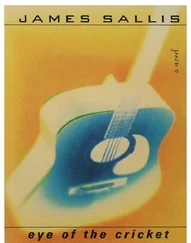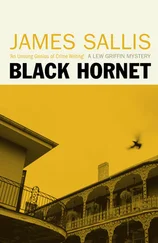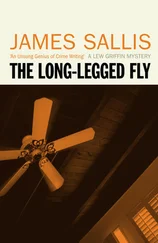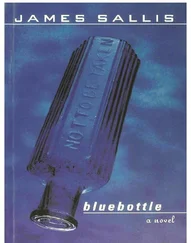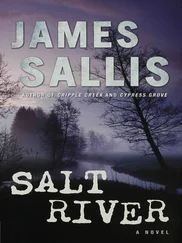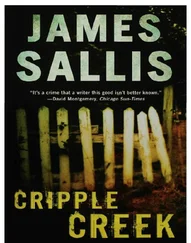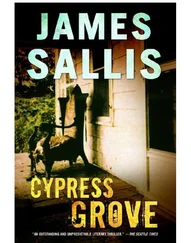James Sallis - Ghost of a Flea
Здесь есть возможность читать онлайн «James Sallis - Ghost of a Flea» весь текст электронной книги совершенно бесплатно (целиком полную версию без сокращений). В некоторых случаях можно слушать аудио, скачать через торрент в формате fb2 и присутствует краткое содержание. Жанр: Криминальный детектив, на английском языке. Описание произведения, (предисловие) а так же отзывы посетителей доступны на портале библиотеки ЛибКат.
- Название:Ghost of a Flea
- Автор:
- Жанр:
- Год:неизвестен
- ISBN:нет данных
- Рейтинг книги:4 / 5. Голосов: 1
-
Избранное:Добавить в избранное
- Отзывы:
-
Ваша оценка:
- 80
- 1
- 2
- 3
- 4
- 5
Ghost of a Flea: краткое содержание, описание и аннотация
Предлагаем к чтению аннотацию, описание, краткое содержание или предисловие (зависит от того, что написал сам автор книги «Ghost of a Flea»). Если вы не нашли необходимую информацию о книге — напишите в комментариях, мы постараемся отыскать её.
Ghost of a Flea — читать онлайн бесплатно полную книгу (весь текст) целиком
Ниже представлен текст книги, разбитый по страницам. Система сохранения места последней прочитанной страницы, позволяет с удобством читать онлайн бесплатно книгу «Ghost of a Flea», без необходимости каждый раз заново искать на чём Вы остановились. Поставьте закладку, и сможете в любой момент перейти на страницу, на которой закончили чтение.
Интервал:
Закладка:
One diffident hand made its way to the surface, floated there a moment with fingers together like logs in a raft-confirming? allaying? — then subsided. Guidry’s chin followed the hand down to sink onto his chest, bisecting the curve. He snored.
I eased from the chair and made my way into the outer room. Guidry’s home had been built around the turn of the century as Europeans began taking over the city and crept by degrees uptown, putting up ever more magnificent homes in rivalry to those of downtown Creoles. At one point, like many others, the home had been transformed, to a hotel in this case, but unlike others suffered few structural modifications. This outer room, originally intended as parlor or sitting room, in its hotel period a lobby, had remained much the same through all the home’s avatars.
Mrs. Molino rose from behind an elegant antique desk that put one in mind of stilt-legged birds.
“He’s asleep,” I said.
She nodded.
“For much of the day. And careening about the past the remainder. There’s not a lot left to him. Or of him. We always think of the elderly as increasingly needy, but it’s quite the opposite, really. Their lives get simpler-attain a kind of purity. There’s little enough now that I can do for the doctor. I manage his affairs, offer what comfort I can. Just as you’ve done. Thank you again for coming.”
“I’m not sure why I did, or, for that matter, what good it may have done. But you’re welcome.”
“Mr. Griffin?” she said behind me.
I turned.
“He’s concerned over the letters, isn’t he? The messages Alouette has been receiving.”
“Should he be?”
She stepped briskly across the room to stand close. Tall and slender, man’s oversize white dress shirt billowing out in the breeze of her passage, making me remember the first time I saw Deborah there beside the counter in her shop and thought willowy , as I’d done so often since. No sign of internal struggle in her eyes.
“That’s not for me to say.”
I could smell the shampoo she’d used that morning, apples and pears, a quiet tide of garlic, olive and lemon on her breath. Massively unsure of myself and long out of practice, signals a blur, I asked if she might consider having dinner with me. Or just coffee, if she’d be more comfortable with that.
I’ve embarrassed her, I thought at first; then, as she regained composure, recognized her reaction for what it was: some essential core of shyness overcome but unvanquished. Her eyes met mine.
“Understand that it’s terribly difficult for me to get away …”
I nodded.
“But yes. Yes, I’d like that very much, Mr. Griffin.”
“Good.”
“You have my number. Please call. We’ll arrange something.”
Touching her lightly on the upper arm, I took my leave.
From a phone in a K amp;B just down the street I dialed her number. New-fashioned teenagers sat with piercings and bleached hair behind old-fashioned stemmed glasses of cherry phosphate and malted milk at the lunch counter. A hunched, rickety man pushed himself erect before the display of condoms, natural vitamins and copper bracelets to brace the harried pharmacist over conflicting needs and insurance plan, his wheelchair’s E-cylinder of oxygen a silent witness.
“Mr. Griffin calling about those arrangements,” I said, “could you please hold?”
She laughed. “Certainly. This is a bit earlier than I’d expected to hear from him. Will you tell Mr. Griffin that?”
“I will indeed. Anything else I should tell him?”
“Well … There’s a good chance I’d be ready by seven, if he happened by. And a fair chance, too, that reservations might be waiting for us at Commander’s.”
“Seven. Commander’s. Got it. And who is this again?”
The connection went. She would have set the phone gently in its cradle. Smiling.
Chapter Twenty-Six
Morning’s his best time, Catherine Molino said of Guidry. And my worst.
That particular morning, after returning to the house, drinking a pot of coffee and reading deeply into Rimbaud, I pulled my detective out of the box in which he’d rested peacefully for years, propped him up and set him to work, writing in his guise, there at the kitchen table as I looked past sink and sill and recalled a stream of cheap apartments:
My room looks out on a garden. There are enormous trees beneath my narrow window. At three in the morning, the candlelight grows dim and all the birds start singing at once in the trees. No more work. I gaze at trees and sky, transfixed by that inexpressible first hour of morning. I can see the school dormitories, completely silent. And already I hear the delicious, resonant, clattering sound of carts on the boulevards.
I have another drink and spit on the roof-tiles-because my room is a garret. Soon I’ll go down to buy bread. It’s that time of day. Workers are up and about all over the place. I’ll have a drink or two at the corner bar, come back to eat my bread and leftovers, be in bed by seven, when the sun brings woodlice out from under the roof-tiles.
Early mornings in summer and December evenings-these are what I remember, what I love most about this place I find myself.
I paused, changed the period to a comma, and added:
this place where I’ve fallen to earth anew.
Just what had prompted me to carry this away from my reading of Rimbaud? Why, of all things, candles? And, given that my books were set in New Orleans, surely the woodlice should be roaches-of the hearty species that, as one local friend notes with more than a touch of pride, rock you back on your heel when you step on them? But something had caught, and this wouldn’t be like other times I’d sat at the table scribbling. These pages wouldn’t go onto the heap of bills, junk mail and newspapers on the shelf by the table, by the Mason jar stuffed full of corks from wine bottles and the mug with its stub of a handle like a broken tooth and its cargo of buttons, paper clips, corroded copper pennies, dimes worn smooth. These pages would be, as they grew, my last book, a return to where it all started.
When the phone rang, levering me back into this world, I looked up in surprise. The clock on the stove read 1:13. Had I always known it was there? Small engines go on ticking everywhere about us.
Four calls all told, that afternoon.
The first was from Jeanette asking Deborah and me to dinner with her, Don and Derick that night. Kind of a celebration, she said. Though of what, they hadn’t decided yet. Maybe we could all do that together, decide.
“Thanks, Jeanette, but incredibly enough you’ve caught me on one of those rare evenings-these occur maybe two or three times a year-when I actually have plans.”
“Well, we’re sorry, of course. But we can do this later.”
“That would be great. As long as it’s not too much trouble.”
“We have dinner most nights, Lewis.”
“True enough. But you don’t celebrate every night.”
She paused before saying, “In our own way, I think we do.”
“There’s something else, Jeanette.”
I told her about Deborah’s departure.
“I’m so sorry, Lew. Are you okay?”
“I will be, sure.”
“If there’s anything we can do …”
“Thanks.”
“We’ll talk soon.”
“You bet.”
I’d barely made it back to kitchen, chair and legal pad before the phone rang again. I sat looking through the open doorway at the phone on its table, newel post, wooden floor, the pattern of it. A composition, like Van Gogh’s painting of his room at Arles, something brought to stillness and no longer quite of this world.
“I’ll be there in ten minutes,” Don said when I picked up.
“No need, my friend.”
Читать дальшеИнтервал:
Закладка:
Похожие книги на «Ghost of a Flea»
Представляем Вашему вниманию похожие книги на «Ghost of a Flea» списком для выбора. Мы отобрали схожую по названию и смыслу литературу в надежде предоставить читателям больше вариантов отыскать новые, интересные, ещё непрочитанные произведения.
Обсуждение, отзывы о книге «Ghost of a Flea» и просто собственные мнения читателей. Оставьте ваши комментарии, напишите, что Вы думаете о произведении, его смысле или главных героях. Укажите что конкретно понравилось, а что нет, и почему Вы так считаете.


